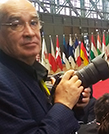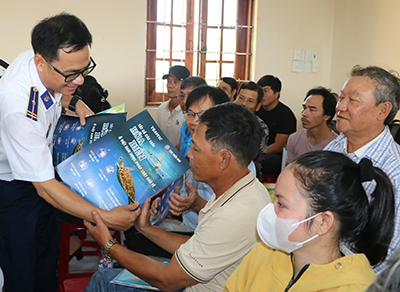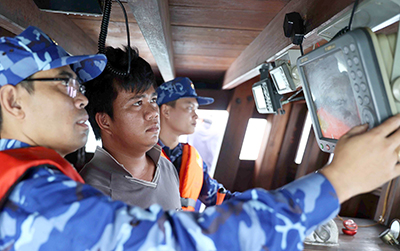Re édition Bruxelles, le 07 janv. 2025 - 18:17:09

François Vieira
PhotoJournaliste accrédité* UE
*1999 - 2024
Membre du Syndicat des Journalistes à Lisbonne
Voir : Suivantes >>>

PRÉSENTE...
La Une UE Monde -
"VIETNAM INFOS VNA"
"VIETNAM HALIEUTIQUE"
Le Vietnam développe une filière halieutique durable et renforce son intégration internationale.

Le Commandement de la Région 2 de la Garde côtière vietnamienne distribue des dépliants de sensibilisation sur la lutte contre la pêche INN aux pêcheurs.
© Dinh Huong - VNA
Avec un engagement résolu en faveur d’une pêche durable et responsable, le Vietnam poursuit ses efforts pour obtenir la levée du “carton jaune” imposé par la Commission européenne (CE) pour la pêche illicite, non déclarée et non réglementée (INN).
Les avancées enregistrées dans les provinces côtières, associées à l’implication des autorités compétentes, témoignent de la volonté du pays de préserver ses ressources marines tout en se conformant aux standards internationaux.
Les pêcheurs, partenaires clés
des autorités
Dans cette dynamique, de nombreux pêcheurs des provinces littorales du Vietnam jouent un rôle actif aux côtés des autorités. Leur engagement contribue à diffuser une culture du respect des lois et à maintenir la réputation de la filière halieutique nationale.
Ông Xuân Hiền, pêcheur établi dans le quartier de Hà Tiên, province d’An Giang (Sud du Vietnam), soutient depuis de nombreuses années les actions de sensibilisation, de sauvetage et de secours en mer. Il mobilise et éveille la communauté des pêcheurs autour de la conscience juridique, convaincu que toute infraction liée à la pêche INN compromet à la fois l’avenir de la profession et les moyens de subsistance durables des familles.

Inspection d’un dispositif de suivi installé à bord
d’un bateau de pêche. © An Dang-VNA
Dans la commune de Bình Giang, également située dans la province d’An Giang, Hoàng Xuân Thu, fort de plus de 40 années passées en mer, rappelle inlassablement à ses enfants et petits-enfants l’importance du respect des réglementations. Il insiste sur l’interdiction absolue de franchir les frontières maritimes pour pêcher dans les eaux étrangères et proscrit l’usage d’engins illégaux, d’explosifs ou de produits chimiques. Toujours disponible pour sa communauté, il met ses embarcations à disposition des missions collectives lorsque les autorités locales le sollicitent.
Les gardes-frontières d’An Giang, en plus de leurs patrouilles et du contrôle des journaux de bord, profitent de chaque embarquement ou débarquement pour sensibiliser les pêcheurs à l’importance de la lutte contre la pêche INN, qu’ils considèrent comme une protection de leur propre vie.
Le président du Comité populaire provincial, Hồ Văn Mừng, a souligné la mise en œuvre de mesures fermes, telles que les campagnes ciblées contre les navires dits “trois sans” (sans immatriculation, sans inspection technique, sans permis de pêche), ainsi que le déploiement d’un système d’alerte automatique en cas de perte de signal des dispositifs de surveillance.
À l’instar d’An Giang, la province de Cà Mau, à l’extrême Sud du pays, intensifie ses efforts. Les forces de l’ordre y renforcent les patrouilles et les inspections, tout en mobilisant les pêcheurs pour surveiller, signaler et dénoncer les infractions.
Technologies au service de la traçabilité
et du contrôle
La Garde côtière vietnamienne maintient une présence opérationnelle permanente dans les zones maritimes, notamment celles de chevauchement ou frontalières avec la Thaïlande, la Malaisie, l’Indonésie, ainsi que dans les eaux historiques partagées avec le Cambodge.
Une vigilance particulière est accordée aux navires dont les dispositifs de surveillance (VMS) perdent leur signal ou franchissent illégalement les limites maritimes.
Le Vietnam accélère également sa transition numérique et l’application des technologies dans la gestion des navires de pêche et la traçabilité des produits halieutiques. Il a mis en place le Système de documentation électronique des captures et de traçabilité (eCDT), garantissant désormais une transparence accrue, une fiabilité renforcée et une interconnexion avec les systèmes internationaux tels que le système de certification CATCH de l’UE ou le système de documentation des prises CDS de la FAO.
Selon la Direction vietnamienne des pêches, entre janvier et octobre 2025, les sorties de navires enregistrées via le système eCDT ont augmenté de près de 80%, les arrivées au port de 139%, les certificats de matières premières halieutiques de 290%, et les certificats d’origine des produits de la pêche ont connu une hausse spectaculaire de 785% par rapport à la même période de l’année précédente.
D’après Vũ Duyên Hải, chef adjoint de la Direction des pêches au ministère de l’Agriculture et de l’Environnement, 'les infrastructures informatiques sont en cours de modernisation. Les pêcheurs peuvent désormais mettre à jour leurs données via les plateformes VNeID, Biên phòng (garde-frontière), e-logbook et eCDT."
Par ailleurs, la base de données de contrôle des produits halieutiques importés au Vietnam est désormais connectée au Portail national de guichet unique.
Cette interconnexion permet d’empêcher l’entrée de produits issus de la pêche INN, conformément à l’Accord relatif aux mesures du ressort de l’État du port (AMREP en français ou PSMA en anglais).
Dans ce cadre, le Vietnam met en place des mécanismes de vérification auprès des pays dont les navires battent pavillon. Il contrôle les documents et surveille les produits importés dans les ports maritimes, les usines de transformation et d’exportation, dans le but de garantir qu’aucun produit issu de la pêche illicite ne pénètre la chaîne d’approvisionnement.
Grâce à la direction rigoureuse du gouvernement, à la coordination étroite entre ministères, secteurs et localités, ainsi qu’à une prise de conscience croissante des pêcheurs, le Vietnam reste fermement engagé dans la levée du “carton jaune” lié à la pêche INN. Le pays s’attache à développer une filière halieutique moderne, responsable et durable, contribuant activement au développement de l’économie maritime et à son intégration internationale./.
|